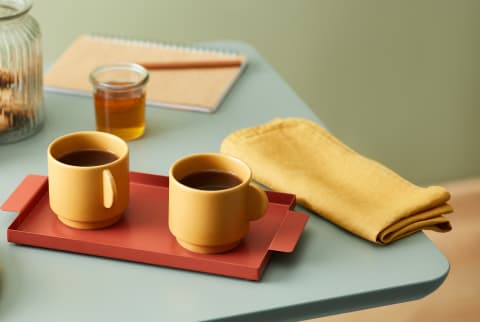Advertisement
How Long Does Tea Stay Fresh? An Herbalist Explains


Have you ever dug through your pantry only to discover a tea blend you'd bought a year ago (or more) and forgotten all about? Or maybe you've brewed a cup of tea, gotten distracted, then wandered upon the cup hours later, wondering if you could still drink it?
Whether your tea is untouched in the box or left in a mug a bit longer than intended, this article is for anyone who's ever asked, "How long is tea good for?"
When does tea expire?
If it's dried:
Whether herbal, black, or green, all tea is made from dried plants that will gradually lose potency over time. If you're careful with storage and keep your tea sealed tightly and out of the light, it can last up to two years. However, if your herbs are exposed to air, humidity, light, or heat, they'll begin to break down more quickly.
A simple way to check for freshness is by using your nose, which is actually a pretty highly refined chemical detector: Familiarize yourself with the scent of the fresh tea before it's brewed. Then, if you're ever unsure how old your herbs are, give the leaves a sniff.
If you do ever make a tea from old herbs, don't worry: The result will simply be a boring brew. It'll be a waste of time, water, and heat, sure, but not a big risk to your health.
If it's brewed:
How long does tea last after it's already brewed? The answer lies in the tea leaves themselves and is further influenced by brewing and storage methods.
Teas made from aromatic herbs—think peppermint, chamomile, or lavender—will last longer than those made from herbs without a strong scent. That's because constituents that give plants their aroma also have preservative, antimicrobial properties. These extend the life of the brewed tea. Herbs that lack those antimicrobial volatile oils—think nettles or red clover—will spoil relatively quickly.
Brewing methods also matter when it comes to a tea's shelf life. If you brew your tea in a jar and cover it while it's still hot, the tea can sit overnight and be fine to drink when you open it in the morning. But if your tea has been sitting in an open mug overnight, it's much more likely to have gone bad by the next day.
This means a mug of nettle tea can go bad overnight, while a mint tea set in the fridge can be fine a few days later. Make sure to smell your tea when it's fresh so that if it starts to go bad, you will know by the smell.
Summary
Does it make a difference if you use loose-leaf or bagged tea?
Yes! When it comes to storage, loose-leaf and bagged teas each have benefits and drawbacks. Here are the top pros and cons to consider when choosing which one is right for you:
Bagged teas:
- Pro: Individual packaging minimizes exposure to air and light, keeping each serving fresh until you use it.
- Con: Herbs are crushed into small pieces, increasing surface area and susceptibility to degradation of flavor, aroma, and beneficial constituents.
- Best For: The free spirit who wants a nice cup whenever the mood strikes and can't force themselves to care about airtight storage in a metal tin.
Loose-leaf teas and bulk herbs:
- Pro: Leaves and herbs dried whole tend to be of higher quality. Whole herbs have less surface area exposed to the elements and will break down slower than the powdered herbs in a tea bag.
- Con: Once the bag or tin has been opened, there's more potential for exposure to air and light than with individually bagged teas. Your storage methods will play a significant role in the tea's useful life.
- Best for: Loose-leaf teas are best for anyone who thinks that storing tea in a dark, airtight tin makes their tea-making ritual all the more enchanting. Also for the tea enthusiast who indulges frequently—their loose-leaf won't be sitting around long enough to lose its vitality, and, as a bonus, they may save money by buying their herbs in bulk.
The takeaway
Learning to buy and brew the right amount of tea so it's there whenever you want it but not sitting so long it gets old might take a little time. Use this information as a loose guide, trust your senses to carry you the rest of the way, and give yourself grace if a little tea goes to waste.
Mistakes are part of the learning experience, and with time you'll perfect a system of keeping just the right amount of herbal teas on hand.

Why Nutrition Is Key To Changing Your Relationship With Alcohol
Brooke Scheller, DCN, CNS

Why Alcohol Sabotages Your Gut Health & How To Get Back On Track
Brooke Scheller, DCN, CNS

Why Nutrition Is Key To Changing Your Relationship With Alcohol
Brooke Scheller, DCN, CNS

Why Alcohol Sabotages Your Gut Health & How To Get Back On Track
Brooke Scheller, DCN, CNS

Why Nutrition Is Key To Changing Your Relationship With Alcohol
Brooke Scheller, DCN, CNS

Why Alcohol Sabotages Your Gut Health & How To Get Back On Track
Brooke Scheller, DCN, CNS

Why Nutrition Is Key To Changing Your Relationship With Alcohol
Brooke Scheller, DCN, CNS

Why Alcohol Sabotages Your Gut Health & How To Get Back On Track
Brooke Scheller, DCN, CNS














